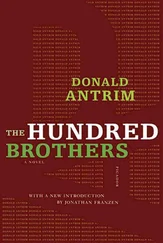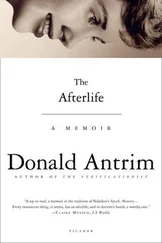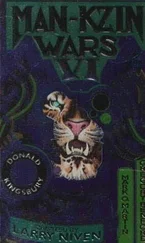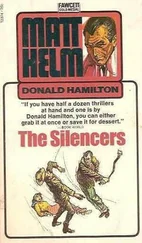The girl stayed silent. Had Bob played things too hard, too fast? Had he revealed himself to be erotically suspect? Apparently these considerations were immaterial to Katharine. She lowered her head in a manner that can best be described as girlish. She peeked around to see who, if anyone, might be watching. She rested her shoulder against Bob’s arm. She was ready to give herself to him.
And so it went. The heavy fog closed in. The rain approached. The city disappeared and the hospital came closer. Bob had Katharine. Leslie had Lang. Maria had Richard. Richard had me. Manuel had my wife. The teenagers had each other. Peter had his students and Elizabeth had Mike and Mike had his kids at home. Terry Kropp was new at the Institute; I knew nothing about him. Dan Graham had, I guess, his cigarettes.
I clutched Rebecca’s hand. In the air, everyone held someone. I watched Rebecca support Lang, who panicked and kicked as Leslie Constant climbed his leg to couple with him. I knew then that Rebecca was undeniably, immutably a Krakower Institute Young Woman of Strength.
Was it too much to hope that we might fly out of here — Rebecca and I, straight out a window or through the Pancake House roof together? Might we (if we tried hard — if, like a made-up boy and girl in a children’s storybook, we wished hard), might we escape this circus scene, this lovelorn human ladder, and instead blast off, break free from the clamorous mob, and penetrate, swiftly, the restaurant’s ceiling, the white tiles and the hardwood beams, the pink insulation and the heavy, noxious tar paper on top? I knew exactly where I’d want to go with Rebecca. Battlefield Grove. That’s right. The primitive burial mound with the Revolutionary War cannon pointed from the low hills to fire on its sacred graves. We’d want to carry a blanket — a blue polyester-blend tablecloth might work — to spread over the ground or wrap ourselves against the night air. Maybe Rebecca would be willing to swoop down and grab a thermos of coffee or tea on the way out. If Bernhardt might kindly loosen his grip, I could possibly manage to reach into my pocket and take out the five-, ten-, and twenty-dollar bills crumpled there, let these drop from my fingers like leaves that would flutter down and settle across the cash-register keys — or if I aimed poorly and missed, the money would fall into the aquarium and get wet, but who cares? — just so that there would be no disputes over the bill. Then off we’d go.
First we’d climb above the fog. Elevation is key. Flying, even the kind of “out-of-body” projection that Rebecca and I would be doing — that she and I were already doing — could, one imagines, be hazardous without clement weather and long-range visibility. This is a technical matter, but it is not strictly, or merely, technical; the psychological ramifications of slamming into a tree or a building are daunting to consider, under any circumstances. In order not to consider them, we would soar above the mist.
How lovely to be in the clear night where no one is smoking cigarettes or eating eggs! I’d have to remember to ask Bernhardt to shift his arms again, just a bit, to take the pressure off my ribs, so that I might suck a clean, wintry breath of air into my lungs. A deep breath. Unfortunately, I don’t know much about the stars in their constellations, so I couldn’t name any for Rebecca. That would not stop us from admiring the Milky Way’s brilliance, or, alternatively, from enjoying a periodic glimpse, a mile or so beneath us, of flat water, our river coursing serpentine across the land, snaking east and south, reflecting occasional moonlight that falls in broken columns through windblown openings in the clouds.
If you follow the river, you’ll come to the battlefield. Rebecca and I go, as the counterculture used to put it, with the flow, tilting our heads to the right and consequently soaring right, leaning to port and sailing gently left. Vigorous motion either way results in rolling. Rebecca and I somersault for fun. We’re showing off! I don’t like too much twirling, because — I should know this by now — it makes me sick to my stomach. She, I am sure, feels the same way. “Let’s take it easy,” I say to her, and in unison we tip back our heads in calculated imitation of the voluntary backward pull you will make when sitting in a rapidly decelerating vehicle. This slows our speed. Now and again a dot or beam of light appears below, and Rebecca and I know we are passing over a house where people are awake, or a car driven along a country lane by someone going home late.
Is it possible that Jane sits clutching the wheel inside one of these cars, our green sedan creeping south through fog along Eureka Drive, past the book factory and down the hill, through the covered bridge and around the old airport, coming to fetch me home after my long night out flirting, arguing, and flying?
What will Jane do when she arrives at the Pancake House to find me gone, risen through the roof beams? Might she take off her coat, relax at a table, nibble a muffin, and chat — casually, as if there were nothing going on between the two of them — with Escobar?
Rebecca and I lean forward in the breeze above the road, repositioning our heads and tucking in chins to streamline for speed. The city is behind us. Rebecca’s hair falls across her shoulders; it blows back in the wind, and I am able for a brief instant to see Brueghel’s dog grinning at me from her neck, and naturally I wonder what this dog wants to tell me.
Ahead lies Battlefield Grove. There’s the burial mound, a grass circle that looks to be, ironically, about the diameter of a cannonball, viewed from on high. Rebecca and I try to avoid knocking into each other as we buzz around checking for a landing place away from trees. I should say that we try to give one another the impression that we are physically avoidant, and in the process collide many times. What is more pleasurable than inadvertent bumping? We’re already holding hands; now I put my arm around her — neither too tentatively nor too confidently. A slight, half-baked hug is all I can attempt. It’s enough. Rebecca feels safe and, although she does not register this immediately, turned on. I tell myself that what I really want is to take care of her, to be the kind of adult she can lean on, to help her separate from her family and get a better job and decide which courses to take in college.
But if this is the case, if my most ardent desire is to counsel and protect, then why am I luring Rebecca to the burial mound, a known make-out destination?
The grass is cushiony. It is long and uncut, matted and bowed over, a meadow in a cold season. I realize, touching down to earth, that it has been a long time — ever since Bernhardt picked me up and forced me to drop the cinnamon-raisin toast — a long time since I stood unsupported on the ground. My toes touch, and I feel the grass compress underneath me. I am wearing understated dress shoes with leather soles and modest arch support, and I am surprised, initially, at the leather’s capacity for transmission of sensation: as my feet land, I comprehend the earth in detail. From beneath the grass stalks, hidden from sight, rocks and other surface irregularities impress themselves against my shoe’s soles; and when my body’s weight bears down, the rocks dig in. I shift and compensate, moving my left foot left, my right to the right; curling, then stretching, my toes and pushing up from the balls of my feet. I stand. A stick cracks beneath my heel, and I become conscious of the first waves of pain traveling down from my lower back, through my pelvis and along the sciatic pathway into my legs. How obvious. Something like this could only be expected after hours spent weightless, the long night in close embrace with Bernhardt. And, undoubtedly, there is a powerful psychological component. The logic of pain, though emotional and, arguably, sentimental, is rudimentary. The pain originates in my lumbar area. This is where, on Jane’s back, the fishermen made of birthmarks survey the horizon from their tiny wooden boats. And it is, on my back, the place where Bernhardt’s erection has been pressing against me; and, really, I think — I can say this as a professional, not just as a sufferer — it’s impossible to underestimate the effect of an intrusive penis in relation to somatized sciatica. Whatever the etiology, I must acknowledge that the spasms make me want to drop to my knees and cry like a baby. I’ve had lower back symptoms before, but never like this, never so piercing and extreme. It is fortunate — and so like her — that Rebecca is beside me. I have my arm draped partway around her waist, and she herself is coming to rest, sinking down in grass that bends and crunches underfoot. Her hip brushes against mine, and her leg touches my leg, and she eases down next to me, and we huddle together at the center of the sacred mound.
Читать дальше












